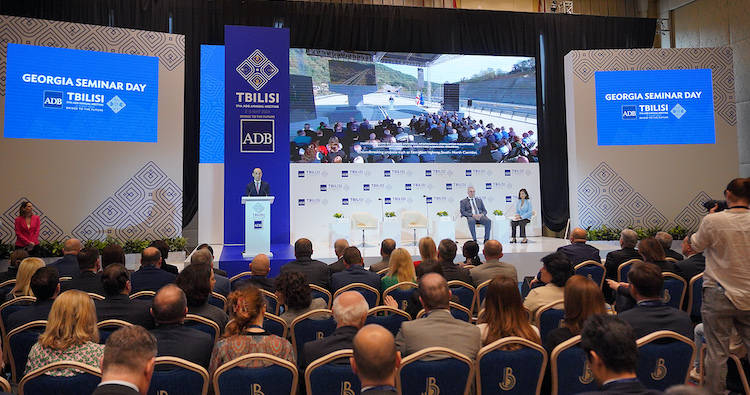Asian Development Bank’s 57th annual meeting opens in Tbilisi

Georgian Economy Minister Levan Davitashvili delivering his speech at the 57th annual meeting of the Asian Development Bank in Tbilisi. Photo: Ministry of Economy
The 57th annual meeting of the Asian Development Bank has been officially opened in the Georgian capital city of Tbilisi with nearly 70 events covering connectivity, climate change, capital market development, artificial intelligence and green globalisation.
Running between Thursday and Sunday, the four-day event has attracted about 3,000 delegates including ADB senior management, policymakers, private sector representatives, and “leading development thinkers” from Asia and the Pacific.
With the theme Bridge to the Future, the event will serve as a premier platform to address key economic and development issues for the region.
The first day of the event saw the Georgia Seminar Day, which was opened by the country’s Finance Minister Lasha Khutsishvili to discuss the country’s “pivotal role” in connectivity, European connectivity, the Middle Corridor logistics route, creation of a regional financial technology hub in Corridor countries, local currency market development, domestic investment potential and opportunities, economic growth and more.
Speaking at the event, Khutsishvili highlighted the country’s “strategic location” at the crossroads of Europe and Asia and emphasised the “unique access” to developing markets that this location offered.
It is a great honour and a responsibility for me to host the Bank's annual meeting in Tbilisi. I am grateful for the support of the dedicated team at the ADB in organising this important event [...] I look forward to today’s discussion and wish you all a productive day. I hope the thematic discussions will be informative and interesting”, he said.
Levan Davitashvili, the First Vice Prime Minister and Economy Minister of Georgia, emphasised the importance of regional ties and the promotion of “common and sustainable development” in the face of challenges resulting from the pandemic and geopolitical conflicts while speaking during the Seminar Day.
He noted investments made by the ADB in Georgia, totalling up to $4.5 billion, for “important” infrastructure projects.
The Minister also highlighted the country's economic growth, which reached double-digit figures of 10.6 percent and 11 percent in 2021 and 2022 respectively and continued with growth rates of 7.5 percent in 2023 and 7.7 percent in January-February of the current year, despite a “large macroeconomic impact” caused by the Covid-19 pandemic.
Speaking at a session titled Enhancing Connectivity: European Connectivity Middle Corridor, Davitashvili said connectivity could have a “synergistic and cumulative” impact on countries and economies. He told participants strengthening regional connections and ensuring structural reforms were “keys” to ensuring economic stability and sustainable long-term growth.
Davitashvili thanked the ADB and other financial institutions for their long-term support in building “quality infrastructure” in the country.
The Minister said Georgia's transport network - including railway modernisation, the Baku-Tbilisi-Kars railway line and the East-West Highway - as well as the Anaklia deep sea port project were aimed at strengthening the country’s role as a connecting bridge between Europe and Asia. Davitashvili also stressed the importance of Georgia’s energy connections, especially the Black Sea submarine cable project, which he said would strengthen regional connectivity.
The importance of this flagship project [referring to the Black Sea submarine cable project] for both Europe and the Caucasus cannot be overestimated - it not only serves to diversify supply routes and reduce supply risks, but also has a great potential to promote the development of renewable energy sources in Georgia and the wider region," the First Vice Prime Minister noted.
The annual meeting also included a panel discussion Collaborative Fintech Community: Building on the Middle Corridor Momentum, where Natia Turnava, the Acting Governor of the National Bank of Georgia, highlighted the country’s investment attractiveness. In her comments Turnava focused on Georgia’s “favourable” business environment, which she said was recognised by international organisations such as the Heritage Foundation, Organisation for Economic Co-operation and Development, and World Bank.
The National Bank said the panel discussion explored initiatives to support fintech development and international payments, as well as “best practices” and projects involving the Georgian side.
Turnava highlighted the “significant contribution” of technological achievements to Georgia’s economic development and explained that productivity in the real economy was responsible for the current “low inflation” and “growing economy”.
She also mentioned the NBG’s “decisive policy” for the development of fintech, with a regulatory framework and “clear” licensing rules.
The NBG Governor noted the banking sector in the country was “highly digitised”, and there had been an increase in digital payments, including mobile banking transactions and QR codes.
Turnava also spoke about the importance of digital banks, which offer another source of increasing payments between countries.
The National Bank is committed to implementing instant payments project by 2025 which will significantly improve payment services in Georgia. Since 2022 the NBG has supported the establishment of three digital banks, one of which facilitates seamless transactions with the European Union Economic Area, and the other is the world's first programmable bank established in Singapore”, she said.
After the panel discussion, a memorandum of cooperation was signed between the National Bank and the global fintech company Elevandi for establishing a basis for development of financial technology industry and facilitating “effective sharing” of knowledge and experience.
 Tweet
Tweet  Share
Share